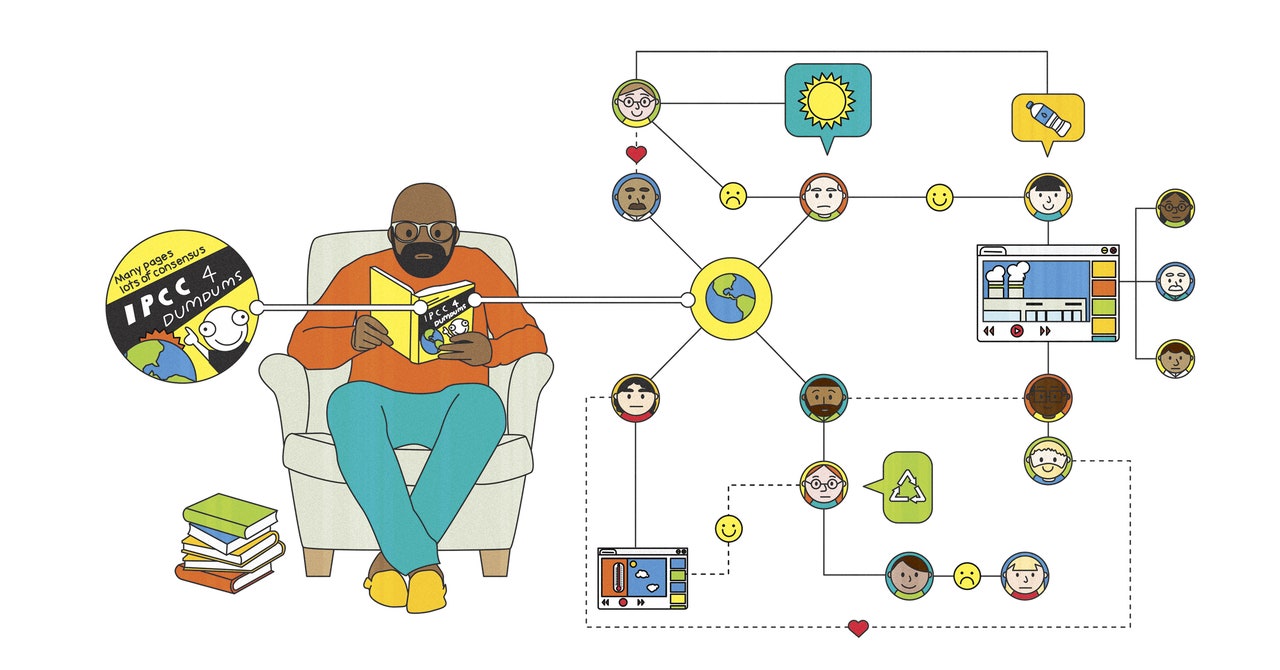Lately I’ve tried to get through the major report of the UN Intergovernmental Panel on Climate Change, the one that came out late last year, called “Climate Change 2021: The Physical Science Basis”. It’s challenging because (a) I, uh, have to learn along the way, and (b) the PDF contains nearly 4,000 pages of aggregated, footnotes, illustrated scientific consensus on the weather. That’s too much consensus; everyone agrees. But it’s clear that they – the hundreds of IPCC-affiliated scientists who put together this behemoth –want us to read it, right? The thing exists, so I should at least try it. In addition, it is free to download. I like a bargain.
However, the giant PDF broke my e-reader. Over time I got it working, but the font was too small. So I used a command-line tool called mutool to split each page in half, and now I can read the book in landscape mode with a larger font size, a little hack I’m embarrassingly proud of – even though the resulting document is nearly 8,000 pages long.
Eight kilo pages is a lot, but a really long book is still a book: You start at the beginning, skip the intro pages, flip through the “Summary for Policymakers”, skip forward 7,000 pages, and read a bit of “Annex V: Monsoons .” Okay, so maybe it’s not really a book, more like a database that is the result of a complicated bureaucratic process, I make it a few pages at a time, until my brain refuses to go on without a Twitter pause.
Frustrated by my slow progress, I started using Twitter to look up the climate scientists themselves, clicking through their timelines. It’s a good way to see what they’re up to — to pick up on social cues that might help the rest of their network better understand. As you would expect from a group of extremely smart literal cloud people, they are not exactly stuffy real posters. Some speak in press releases; some like to share scientific news. But personal details always leak out – children and husbands and the like. You see their little avatar faces, come across an artifact like a Spotify playlist, witness their naked enthusiasm for glaciers. Reading this really makes me feel like I’m crawling.
I think this kind of filthy spying – peeping – is a particularly… internet way of learning. Like when you wake up and all the social media posts circulating in your peer group are suddenly over a thingbut you don’t know what the thing is. Usually the tweets are elliptical, such as “Couldn’t happen to a nicer columnist” or “Just show you what’s really happening in the mineralogy community.” In fact, the more vague they are, the more likely the thing is really bad and/or lustful. So now you – not a higher priority – need to blow up your morning and use context clues to unpack the scandal, poke around the network, see who liked what, paste tweets into your group chats to see if anyone has any insight, until you find out who has been called for what by a now locked account, with the end result of course that you to do sort it out, some filthy filthy thing someone said or did, and, well, you can go about your day and wait for the story to appear in a cancel culture essay.
I’m not proud of this. I just have to do the. Sometimes it’s the only way to learn about subcultures and communities. If you’re researching software history, which I love to do, you have to venture into copyright-dubious Discords and quirky archive-oriented websites and sneak around until you figure out how to get your hands on the right stuff. You have to go through a lot of gossip, drama, fights whether emulating old computers in software is “real” or not. And if you lurk long enough, read enough forum threads, someone will post a temporary link to the special Google Doc full of links to zip files with confusing titles. The internet is turning the world into a puzzle that you must solve to feel safe. It’s scary, of course, but when you solve the puzzle, you feel an incredible sense of control. (Unfortunately, this is also how you get QAnon.)
But being a sneak browser is also just who I am. Because of cowardice, extreme shyness, or maybe toxic masculinity (choose what works for you), I’d rather spy for a year than ask a direct question. This is an unfortunate quality of a journalist. A journalist’s job is to call smart people and ask them to explain things. These people have to talk to you because it helps their career. I find that I always slightly misunderstand what they tell me; I misunderstand the tone, and then they send corrective emails that pulverize my soul. I’d rather look at a civilization’s artifacts than participate in them. Twitter, Newsletters, Slacks, Discords: Lurking is learning.
So give me a network and the tools to read it. Give me the textbook called Webmarkup languages produced in angerthe anthology of GitHub posts called You can’t program in Lisp because you’re an idiotthe climate report called “Energy-Systems People and Earth-Systems People: The Longest Thread.”

